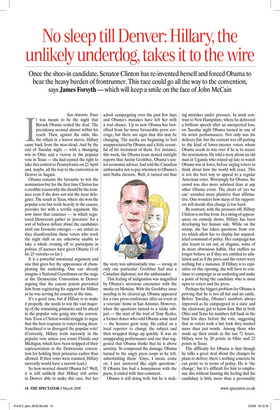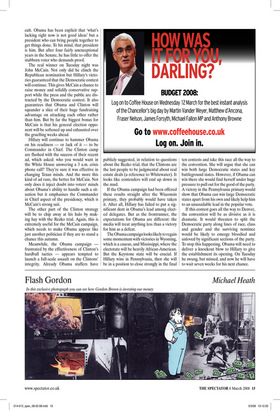No sleep till Denver: Hillary, the unlikely underdog, takes it to the wire
Once the shoo-in candidate, Senator Clinton has re-invented herself and forced Obama to bear the heavy burden of frontrunner. This race could go all the way to the convention, says James Forsyth — which will keep a smile on the face of John McCain San Antonio, Texas It was meant to be the night that Barack Obama sealed the deal. The presidency seemed almost within his reach. Then, against the odds, like the villain in a horror movie, Hillary came back from the near-dead. And by the end of Tuesday night — with a thumping win in Ohio and a victory in the popular vote in Texas — she had earned the right to take this contest to Pennsylvania on 22 April and, maybe, all the way to the convention in Denver in August.
Obama remains the favourite to win the nomination but for the first time Clinton has a credible reason why she should be the nominee even if she does not win the most delegates. The result in Texas, where she won the popular vote but trails heavily in the caucus, provides her with a terrific argument. She now insist that caucuses — in which registered Democrats gather in ‘precincts’ for a sort of balloon debate about the candidates until one favourite emerges — are unfair as they disenfranchise those voters who work the night shift or are otherwise unable to take a whole evening off to participate in politics. (Caucuses have given Obama 11 of his 25 victories so far.) It is a powerful emotional argument and one that gives her the appearance of championing the underdog. One can already imagine a National Guardsman on the stage at the Democratic Convention in Denver arguing that the caucus system prevented him from registering his support for Hillary as he was serving his country at the time.
It’s a good case, but if Hillary is to make it properly, she needs to win the vast majority of the remaining primaries and be ahead in the popular vote going into the convention. Even a Clinton would struggle to argue that the best response to voters being disenfranchised is to disregard the popular vote! (Currently, Hillary trails narrowly in the popular vote unless you count Florida and Michigan, which have been stripped of their representation at the Democratic convention for holding their primaries earlier than allowed. If their votes were counted, Hillary currently would have a narrow lead.) So how worried should Obama be? Well, it is still unlikely that Hillary will arrive in Denver able to make this case, but her adroit campaigning over the past few days and Obama’s mistakes have left her with a real chance. Up to now Obama has benefited from far more favourable press coverage, but there are signs that this may be changing. The media are beginning to feel unappreciated by Obama and a little resentful of his treatment of them. For instance, this week, the Obama team denied outright reports that Austin Goolsbee, Obama’s senior economic adviser, had told the Canadian ambassador not to pay attention to Obama’s anti-Nafta rhetoric. Well, it turned out that the story was substantially true — wrong in only one particular: Goolsbee had met a Canadian diplomat, not the ambassador.
This feeling of indignation was magnified by Obama’s atrocious encounter with the media on Monday. With the Goolsbee issue needing to be cleared up, Obama appeared for a rare press conference after an event at a veterans’ home in San Antonio. However, when the questions turned to a tricky subject — the start of the trial of Tony Rezko, a former donor who sold Obama some land — the Senator grew testy. He called on a local reporter to change the subject and then wrapped things up quickly. It was an unappealing performance and one that suggested that Obama thinks that he is above scrutiny. To compound the damage, Obama turned to the angry press corps as he left, admonishing them: ‘Guys, I mean, come on. I just answered like eight questions.’ If Obama has had a honeymoon with the press, it ended with that comment.
Obama is still doing well, but he is mak ing mistakes under pressure. In stark contrast to New Hampshire, where he delivered a brilliant speech after an unexpected loss, on Tuesday night Obama turned in one of his worst performances. Not only was his delivery flat, but the content was off-putting to the kind of lower-income voters whom Obama needs to win over if he is to secure the nomination. He told a story about an old man in Uganda who stayed up late to watch Obama win in Iowa, before urging voters to think about how the world will react. This is not the best way to appeal to a regular American voter. Worryingly for Obama, the crowd was also more subdued than at any other Obama event. The chant of ‘yes we can’ sounded more plaintive than affirmative. One wonders how many of his supporters will decide that change is too hard.
By contrast, with the pressure off, Hillary Clinton is on fine form. In a string of appearances on comedy shows, Hillary has been developing her human side. While on the stump, she has taken questions from voters which allow her to display her unparalleled command of policy. Her campaign has also learnt to cut out, or disguise, some of its more obnoxious habits. Her staffers no longer behave as if they are entitled to adulation and as if the press and the voters were nothing but a nuisance. If Hillary is to capitalise on this opening, she will have to continue to campaign as an underdog and make a point of being the candidate who is most open to voters and the press.
Perhaps the biggest problem for Obama is proving that he is not all hat and no cattle. Before Tuesday, Obama’s numbers always improved as he campaigned in a state and the electorate got to know him. But in both Ohio and Texas his numbers fell back in the final few days before the vote, suggesting that as voters took a last look they wanted more than just words. Among those who made up their minds in the last 72 hours, Hillary won by 20 points in Ohio and 23 points in Texas.
The difficulty for Obama is that though he talks a great deal about the changes he plans to deliver, there’s nothing concrete he can point to in terms of policy. He is ‘the change’, but it’s difficult for him to emphasise this without fanning the feeling that his candidacy is little more than a personality cult. Obama has been explicit that ‘what’s lacking right now is not good ideas’ but a president who can bring people together to get things done. To his mind, that president is him. But after four fairly unexceptional years in the Senate, he has little to offer the stubborn voter who demands proof.
The real winner on Tuesday night was John McCain. Not only did he clinch the Republican nomination but Hillary’s victories guaranteed that the Democratic contest will continue. This gives McCain a chance to raise money and solidify conservative support while the press and the public are distracted by the Democratic contest. It also guarantees that Obama and Clinton will squander a slice of their huge fundraising advantage on attacking each other rather than him. But by far the biggest bonus for McCain is that his general election opponent will be softened up and exhausted over the gruelling weeks ahead.
Hillary will continue to hammer Obama on his readiness — or lack of it — to be Commander in Chief. The Clinton camp are flushed with the success of their recent ad, which asked: who you would want in the White House answering a 3 a.m. crisis phone call? They’re sure it was effective in changing Texan minds. And the more this kind of ad runs, the better for McCain. Not only does it inject doubt into voters’ minds about Obama’s ability to handle such a situation but it emphasises the Commander in Chief aspect of the presidency, which is McCain’s strong suit.
The other part of the Clinton strategy will be to chip away at his halo by making hay with the Rezko trial. Again, this is extremely useful for the McCain campaign, which needs to make Obama appear like just another politician if they are to stand a chance this autumn.
Meanwhile, the Obama campaign — frustrated by the effectiveness of Clinton’s hardball tactics — appears tempted to launch a full-scale assault on the Clintons’ integrity. Already Obama staffers have publicly suggested, in relation to questions about the Rezko trial, that the Clintons are the last people to be judgmental about real estate deals (a reference to Whitewater). It looks like contenders will end up down in the mud.
If the Obama campaign had been offered these results straight after the Wisconsin primary, they probably would have taken it. After all, Hillary has failed to put a significant dent in Obama’s lead among elected delegates. But as the frontrunner, the expectations for Obama are different: the media will treat anything less than a victory for him as a defeat.
The Obama campaign looks likely to regain some momentum with victories in Wyoming, which is a caucus, and Mississippi, where the electorate will be heavily African-American. But the Keystone state will be crucial. If Hillary wins in Pennsylvania, then she will be in a position to close strongly in the final ten contests and take this race all the way to the convention. She will argue that she can win both large Democratic states and key battleground states. However, if Obama can win there she would find herself under huge pressure to pull out for the good of the party. A victory in the Pennsylvania primary would show that Obama can win large Democratic states apart from his own and likely help him to an unassailable lead in the popular vote.
If this contest goes all the way to Denver, the convention will be as divisive as it is dramatic. It would threaten to split the Democratic party along lines of race, class and gender and the surviving nominee would be likely to emerge bloodied and unloved by significant sections of the party. To stop this happening, Obama will need to deliver a knockout blow to Hillary to give the establishment its opening. On Tuesday he swung, but missed, and now he will have to wait seven weeks for his next chance.



















































































 Previous page
Previous page